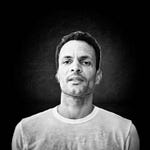My friend Justin leads Revenue Based Financing at Wefunder (where I also work), a platform that helps startup founders raise capital from their customers and community, as well as VCs and millionaires.
Me and Justin have known each other for over a decade now. After starting his career in sales at LinkedIn, Justin very quickly got bored, and came to volunteer at Kiva.org in 2012, where I was leading the Kiva U.S. team. Over the next 5 years, we co-led that program together in San Francisco, before Justin left to start his own boat charter business in San Diego — Chill Charters (enter "Closing Time" at checkout for a 20% discount. Not really… Will probably make this dad joke every week. Apologies in advance…). In 2019, we reunited at Wefunder, where we co-lead the BD team.
Justin is — literally — the best BD person I have ever worked with. And I've probably worked with hundreds at this point, so that's a large sample size! He has an incredible genuineness and authenticity, that shines forth in everything he does. But even though he's usually decked out in tie-dye, and seems to spend about 97% of his waking minutes playing frisbee golf, he's perhaps the most ruthlessly organized person I've ever met. Although not through a "CRM". He has his own system. Even with systems, Justin is a renegade cowboy :)
I asked Justin to articulate the principles that he thinks make him awesome at biz dev. Here's what he said:
The three most important principles:
(1) Organization — Diligently tracking all your conversations, and having different buckets for different types of engagement.
(2) Focus — Having some time throughout the week (e.g. 1 or 2 hours per day) to be proactive, not reactive.
(3) Authenticity — Be yourself. Be an interesting human. Share stories and engage at a personal level, rather than talking about "business" all the time. People want to work with people they like.
And some other secondary principles:
(4) The Anti-Sell — Be real, and totally transparent. Talk openly about why they wouldn't want what you're doing. Set good expectations — for example, "this is going to be hard, and require a lot of effort for you to succeed". Having a hard conversation upfront can significantly improve the relationship going forward.
(5) In-person is powerful — The scope and depth of the relationship totally change when you meet with someone in person. Be selective in choosing the right people, where a 1:1 meeting would enhance the relationship.
(6) Proactively ask for referrals — Write down names when they come up in conversation. In the podcast, Justin talks about how he launched Kiva City Little Rock in less than a month, from a standing start — his success here was largely based on this principle.
(7) "Mission" — Doing something with a purpose, and evangelizing that purpose, makes you so much more compelling, and leads to deeper connections with people you're working with. (Simon Sinek's TED Talk discusses this idea further).
(8) Have interesting conversations — If you are bored, the person on the other side of the call is probably bored as well. Move the conversation in a direction where you're interested and engaged, and it will be a better conversation.
(9) Adding value — Seek to be constantly adding value for your customers and partners. A super easy way to add value is by making connections. But you can also share genuine (not sugar-coated or sycophantic) feedback, or dispense advice. At Wefunder, Justin doesn't limit his interactions with founders to the narrow domain of "running a community round on Wefunder" — but rather, he discusses their business and strategy much more broadly.
And some rapid-fire questions…
What do you look for when you're hiring sales people?
"People who are passionate and creative in how they'd approach the role. I used to optimize for "solid and stable", but in the context of Wefunder, passionate and creative is a better approach for hiring. Being a "missionary" — super excited about the mission and purpose of the company — is critical."
What's your best story around closing a deal?
"I met Anna and purchased her product. It quickly became one of my favorite things. I was proactive in championing her brand, sharing it with everyone I knew. I tried to add value to her business because I wanted to see it out in the world. She saw that passion I had and trusted me with a critical fundraising round, which ended up being a $3M seed round. It was a beautiful intersection of a great founder / product fit with me, and great things came from that relationship."
What's the biggest mistake you've made in your sales career?
"Early in my career, I was advised to be more "professional" and I followed that advice. But it wasn't true to me, and who I am. This was one of the most important learnings in my entire career. If you can turn mistakes into learnings, you win in the long term."
What's a controversial opinion you have about sales?
"In a transactional sales environment, I see the value in a CRM. But in a relationship sales environment, I think CRMs are stupid. My GoogleSheet is better than a CRM. I may be objectively wrong about this, but that checks the controversial opinion box for sure!"
Who's the best sales person you know — and why?
"My friend Evan Cygler who sells Bugattis. Evan is a college roommate, and has the coolest life. His success is all a direct result of his deep passion for awesome cars!"














Share this post